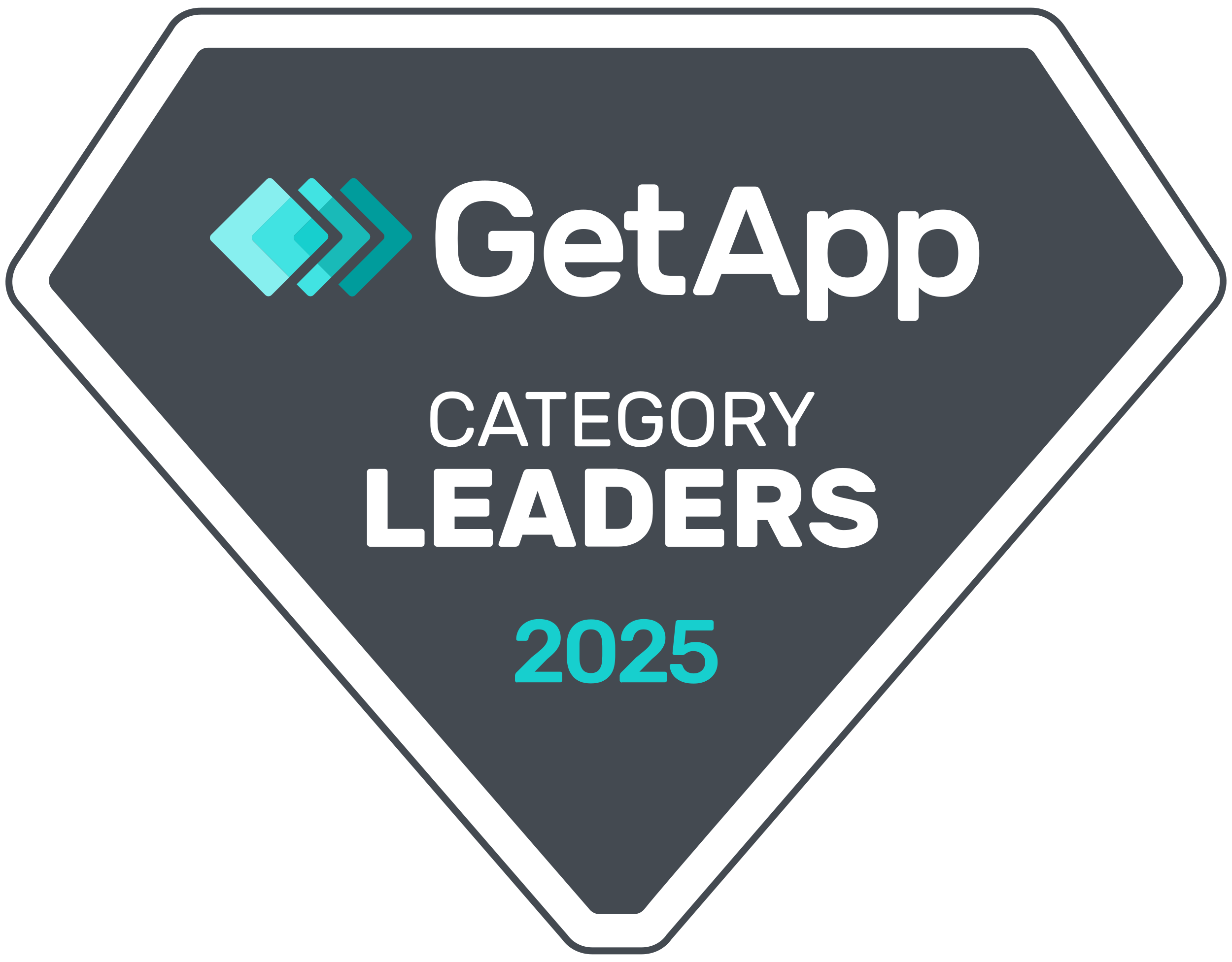The winds of change are sweeping across the boardrooms today. Driven by the increasing demand for transparency and agility, organisations—governments, financial institutions (BFSI), and oil & gas companies—are embracing a new era of digital governance.
Business leaders believe digital governance is a critical aspect of fostering economic growth and stability. This concept is not just about setting principles for social management, but also ensuring sustainable economic development through the use of modern technology.
In this article, we will dive deep into the state of digital governance across Egypt and Jordan, and how businesses in these countries can implement the right governing systems.
Digital Governance in Action: Egypt and Jordan
Digital connectivity has been a critical development focus for many companies in the Middle East and North Africa (MENA) region — promising growth, employment opportunities, and even anti-corruption efforts. While there’s a lot of empirical literature on how digitalisation affects companies’ performance, there’s relatively little research focusing on the ME region.
A 2023 study analysed how digital tools affect the performance of firms, particularly in Egypt and Jordan. In both countries, digital tools are associated with a higher share of female workers, which also benefits from greater access to markets, knowledge, and flexible working arrangements. These labour characteristics reflect good corporate governance practices (e.g. gender diversity, and fair employment practices) — all linked to enhanced productivity and ethical standards. Below are other relevant cases showcasing approaches in digital governance:

Egypt
Government: eGovernment Implementation Plan 2030
In the past, Egypt has struggled with a fragmented e-government landscape with several ministries operating independent online portals. Hence, creating user confusion and hindering access to services. In response, the Egyptian government launched the eGovernment Implementation Plan 2030, creating a unified digital platform for all government services in 2018. Hence, simplifying online access to citizens, reducing administrative burdens, and promoting transparency.
BFSI: National Bank of Egypt (Digital Banking)
In 2022, the National Bank of Egypt (NBE), the oldest bank in the country, announced its first steps into digital banking, as part of its digital transformation strategy. The bank targeted several key areas such as mobile banking, digital onboarding (account opening process), and data analytics for personalised banking products.
Oil & Gas: Smart Solutions and Data Centers
In 2022, the Ministry of Petroleum and Mineral Resources signed three deals with Huawei Technologies to support digital transformation in Egypt’s oil and gas sector. First of the agreement is a cooperation program to develop the skills of oil and gas sector professionals through the “Youth and Intermediate Leadership Development Program.” On the other hand, the two MoUs involve smart solutions and data centers for the country’s oil and gas facilities. The tech company will also supply the facilities with solar energy and storage batteries to operate oil field wellheads.
Jordan
Government: People-Centric Digital Governance
Similar to Egypt, Jordan’s e-government services were scattered across multiple websites, with limited citizen awareness and trust in online services. The government then launched the SANAD portal, a single point of access for over 400 government services. It uses digital signatures and online payment gateways. On top of that, the Government of Jordan also implemented the Economic Modernisation Vision to double the country’s growth rate and improve welfare and environmental sustainability in the next ten years.
BFSI: Capital Bank of Jordan (Modernised Data Hub)
In 2023, the Capital Bank of Jordan engaged with IBM Business Partner JBS and IBM to build a unified data management and data science platform. With data in a single source of truth, the bank gains a holistic view across all customers and their transactions. This has also been critical for detecting suspicious transaction patterns, such as financial fraud, money laundering, and terrorist financing cases. The Capital Bank utilises advanced AI features to create an infrastructure for predictive decision-making and continues to build out its data science capabilities for better data transparency.
Oil & Gas: Cooperation Agreement in Digital Transformation
Last January, Jordan and Saudi Arabia signed a cooperation agreement that aims to foster collaboration in the energy sector, including oil, gas, and electricity. The agreement places an important emphasis on digital innovation in the sector. The countries also plan to develop standards and regulations related to sustainable materials, as part of their commitment to regional energy security and sustainability.
Embracing the Digital Governance Revolution
For many years, the MENA-OECD Initiative on Governance and Competitiveness for Development has supported sustainable economic growth, innovative and modernisation efforts, and public governance reform. Aligning with the program, MENA countries such as Egypt and Jordan are continuously leveraging digital technologies to embed the principles of good governance successfully.
According to a report, a fully digital MENA economy could result in an estimated rise in GDP per capita of 46% over 30 years, a long-term gain of at least $1.6 trillion. But much like companies worldwide, organisations in the MENA region still face hurdles, such as a lack of basic infrastructure and digital literacy, and complex adoption of digital governance initiatives. Despite this, the rapid digital evolution in the MENA region is still conspicuous.
Revitalising Board Management with Digital Technology
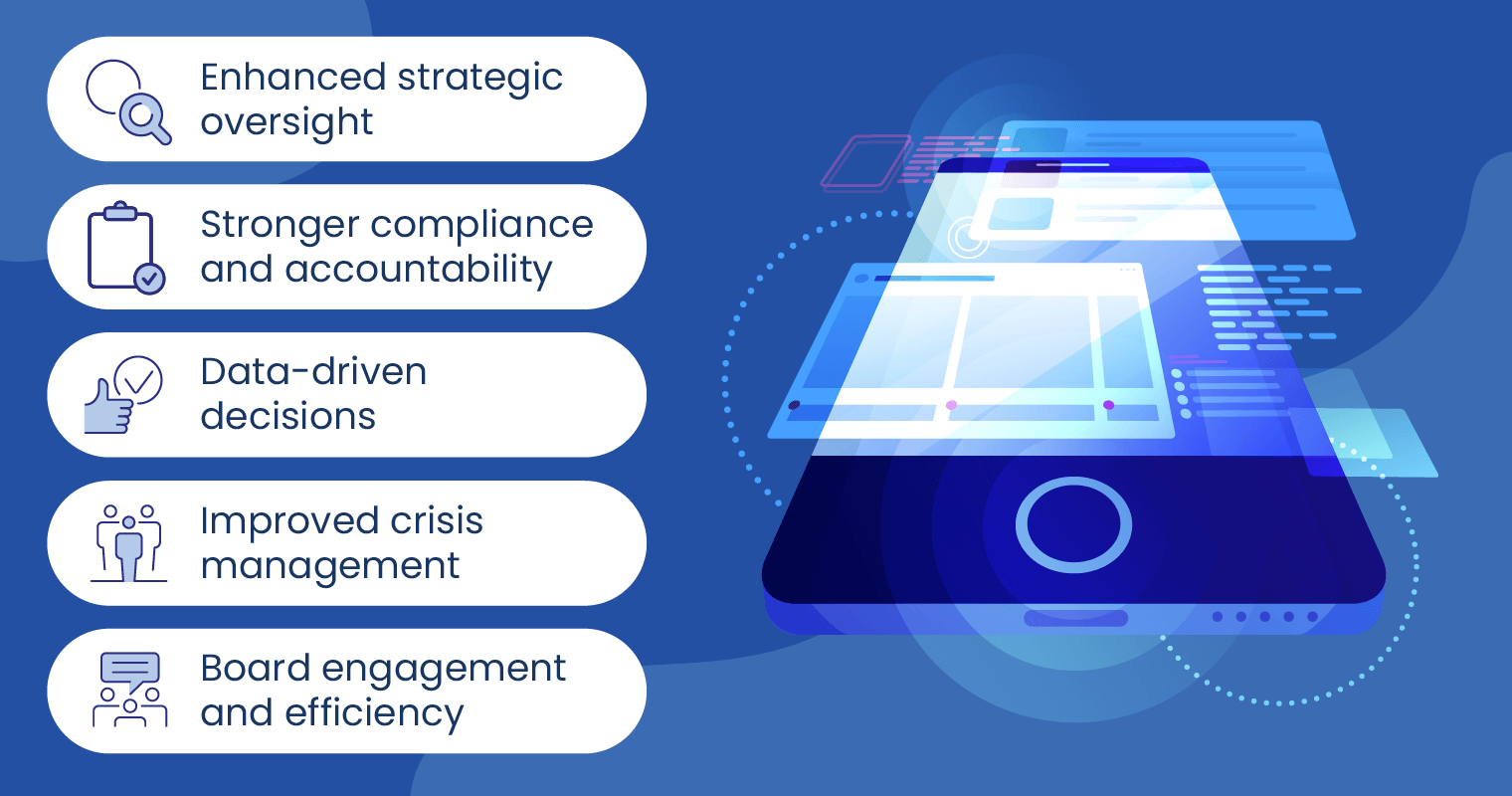
Embracing digital governance requires a proactive approach from boards to leverage emerging technology. If done right, these are the ways digital governance can revitalise board management.
- Enhanced strategic oversight — Digital tools are broadly used in risk management, facilitating complex simulations and data analysis to model potential future scenarios. They are also utilised for real-time performance monitoring and industry analysis that allow boards to check for progress and benchmark against peers for strategic differentiation.
- Stronger compliance and accountability — Many platforms today can now conduct regular audits to assess for compliance with internal policies and external regulations, also improving security posture. Some can even streamline document management for transparency around critical information, and provide secure reporting systems for reporting misconduct or unethical behaviour.
- Data-driven decisions — Identifying patterns, trends, and correlations within vast datasets is now easier with data analytics tools. Advanced algorithms are also available for analysing historical data with greater accuracy, which boards can use to anticipate market shifts and resource needs.
- Improved crisis management — During crises, boards need to facilitate rapid information sharing and coordinated responses. Communication platforms can help with this, allowing boards to relay or implement timely crisis management strategies. Many digital tools can also monitor network activity for suspicious behaviour and potential cyberattacks. Early detection enables boards to implement response protocols before a breach occurs.
- Board engagement and efficiency — From secure access to board materials to streamlining meeting preparation, digital tools help boards save time and focus more on efficient discussion. Video conferencing tools also enable remote participation and increased accessibility, while voting systems are used to facilitate secure voting on resolutions and proposals.
Models for Board Engagement with Technology
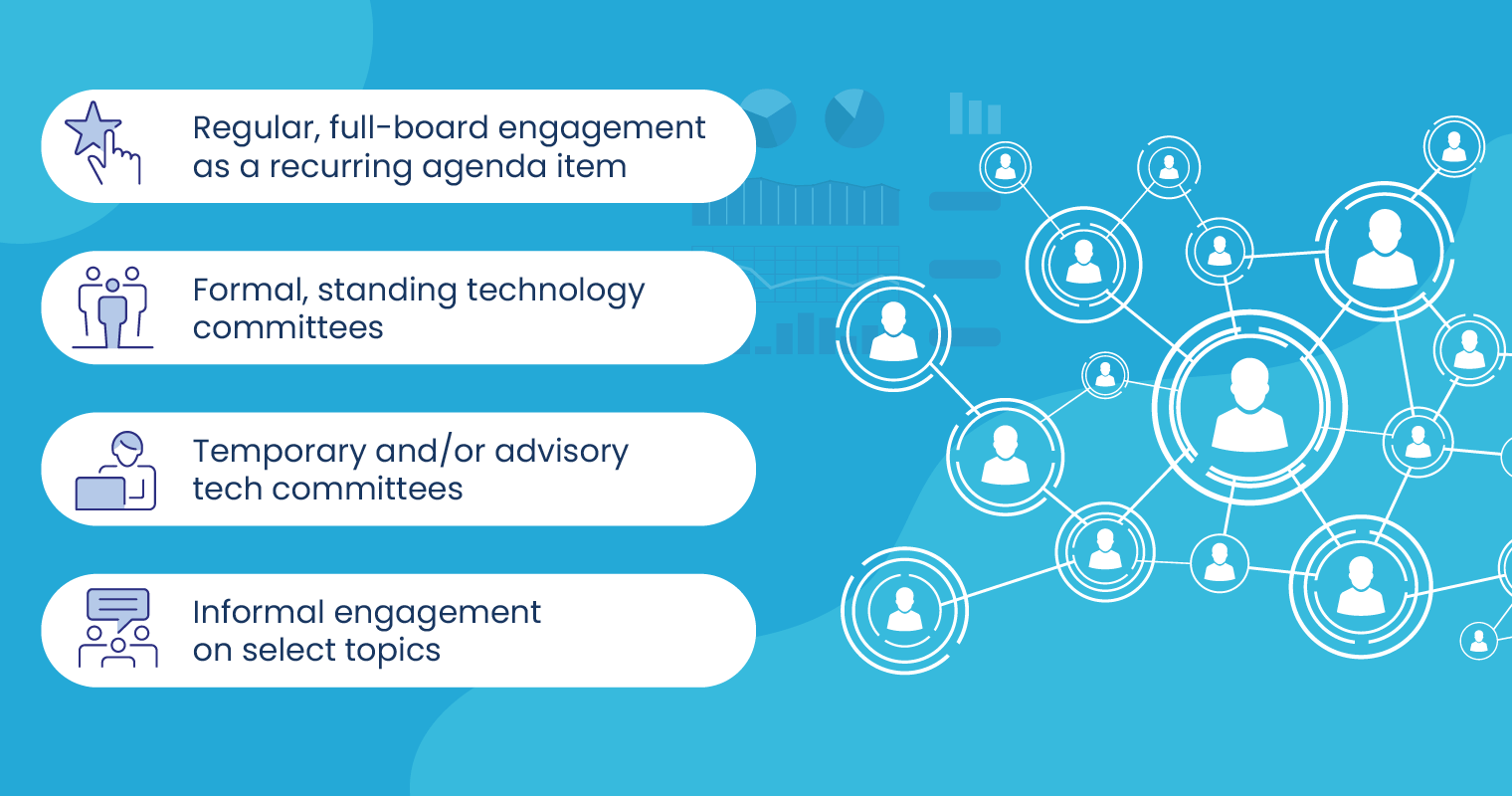
Simply recognising the importance of technology is not enough. But how can boards ensure they are effectively using technology and reaping the benefits of digital governance? A research by McKinsey & Company identifies four effective models for board engagement with technology:
- Regular, full-board engagement as a recurring agenda item — Requires directors to have knowledge about the implications of technology and skills to navigate tech-related issues, such as corporate strategy, operating models, and governance. This model has been used in software businesses, consumer internet, and communications service providers.
- Formal, standing technology committees — A standing technology committee is critical for identifying interdependencies between corporate strategy and digital. This committee can help the broader board prioritise tech decisions. This model has been utilised by FIs relying on digital infrastructure, traditional retailers with growing e-commerce channels, and pharmaceutical firms relying on digital systems to optimise R&D.
- Temporary and/or advisory tech committees — These committees could provide a credible source of oversight and expertise with the right level of transparency. They can also offer guidance on the potential impact of business technologies. It has been used on cloud transitions, major cyber event postmortems, and mergers with substantial IT ramifications.
- Informal engagement on select topics — Best suited for firms lacking or currently building a technology strategy, or boards with expertise in specialised technology. This model is utilised in business units looking to commercialise technical products, and management facing difficulty in board-level, technology discussions.
Using Board Management Software for Digital Governance
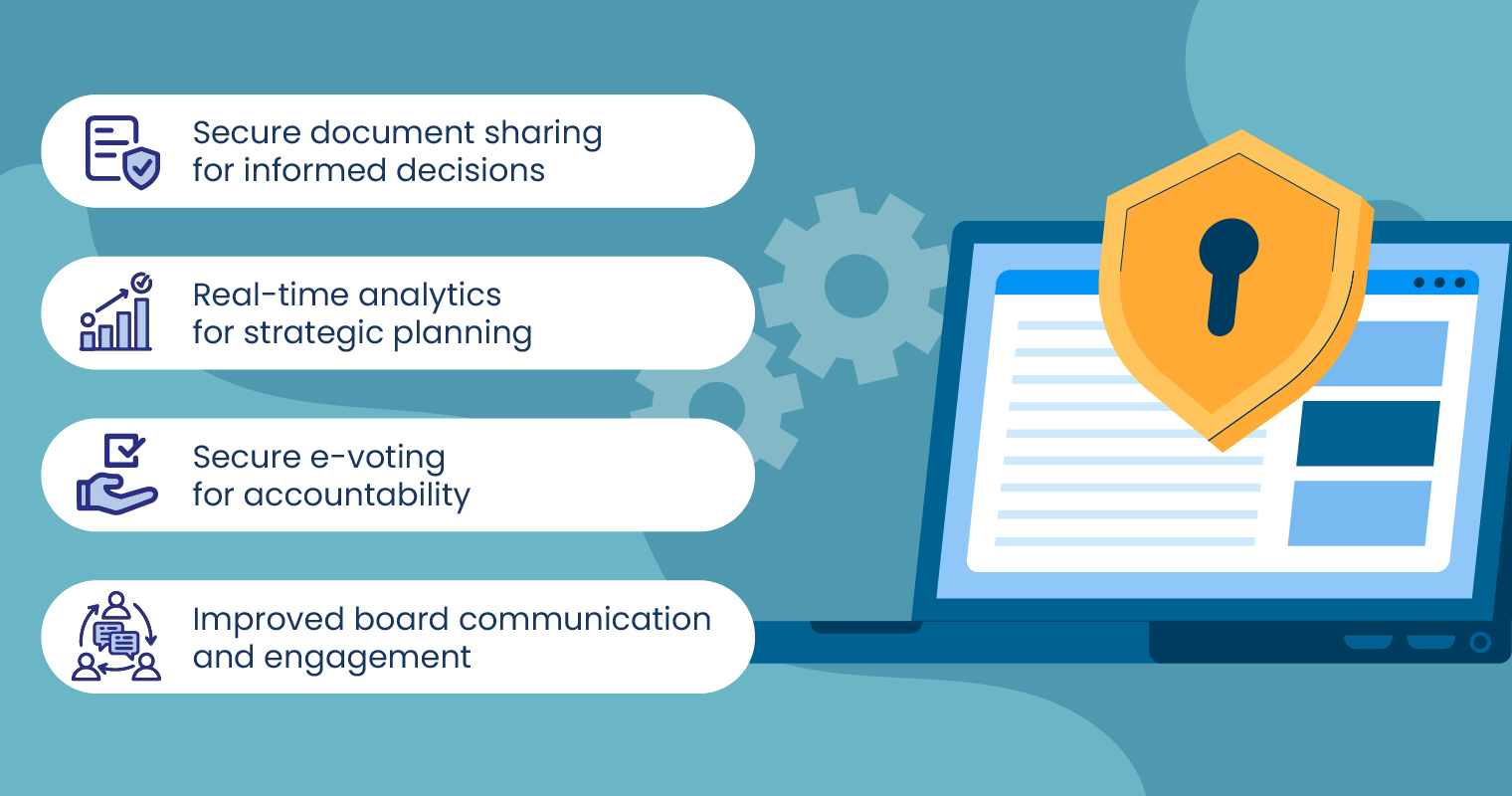
Strong collaboration, transparency, and data-driven decision-making are key aspects of digital governance. Among digital tools available today, board management software (BMS) is a powerful solution that enables an effective approach to digital governance.
- Secure document sharing for informed decisions — Offers secure cloud-based document repositories for boards to access the latest versions of board materials. This prevents security risks and version control issues and promotes informed decision-making.
- Real-time analytics for strategic planning — Some platforms offer integrations with business intelligence tools and provide real-time access to data on areas like cloud service performance or customer satisfaction with digital platforms.
- Secure e-voting for accountability — With secure e-voting capabilities, BMS allows for auditable and efficient voting on resolutions and proposals. Hence, promoting increased transparency and accountability on assigned actions or responsibilities.
- Improved board communication and engagement — Secure communication features within BMS can enable real-time messaging and discussion boards, facilitating ongoing and more focused board collaboration.
Digital Governance Adoption and the Road Ahead
It’s no secret that the global business landscape is undergoing a digital transformation, and effective governance is critical for navigating this change.
Egypt is one of the emerging economies that is committed to digital transformation. Initiatives like the launch of the ICT 20230 Strategy and the establishment of the Information Technology Industry Development Agency (ITIDA) demonstrate a focus on modernising government services. Jordan, on the other hand, has a longer history of e-government initiatives. The launch of the Artificial Intelligence Strategy and Implementation Plan of 2023-2027 highlights Jordan’s continued efforts towards digital transformation.
In addition, the World Economic Forum report emphasises the importance of a people-powered approach. This requires initiatives like Egypt’s focus on open data platforms and Jordan’s digital literacy. Equipping citizens with digital skills and fostering citizen engagement enables the countries to ensure the digital revolution serves the needs of the people, not just the government.
Overall, digital governance is rapidly transforming businesses worldwide, and the ME region is no exception. By embracing technology responsibly, Egypt and Jordan can pave the way for a future where digital governance fosters transparency and a thriving digital economy.
Navigate Digital Governance with Convene
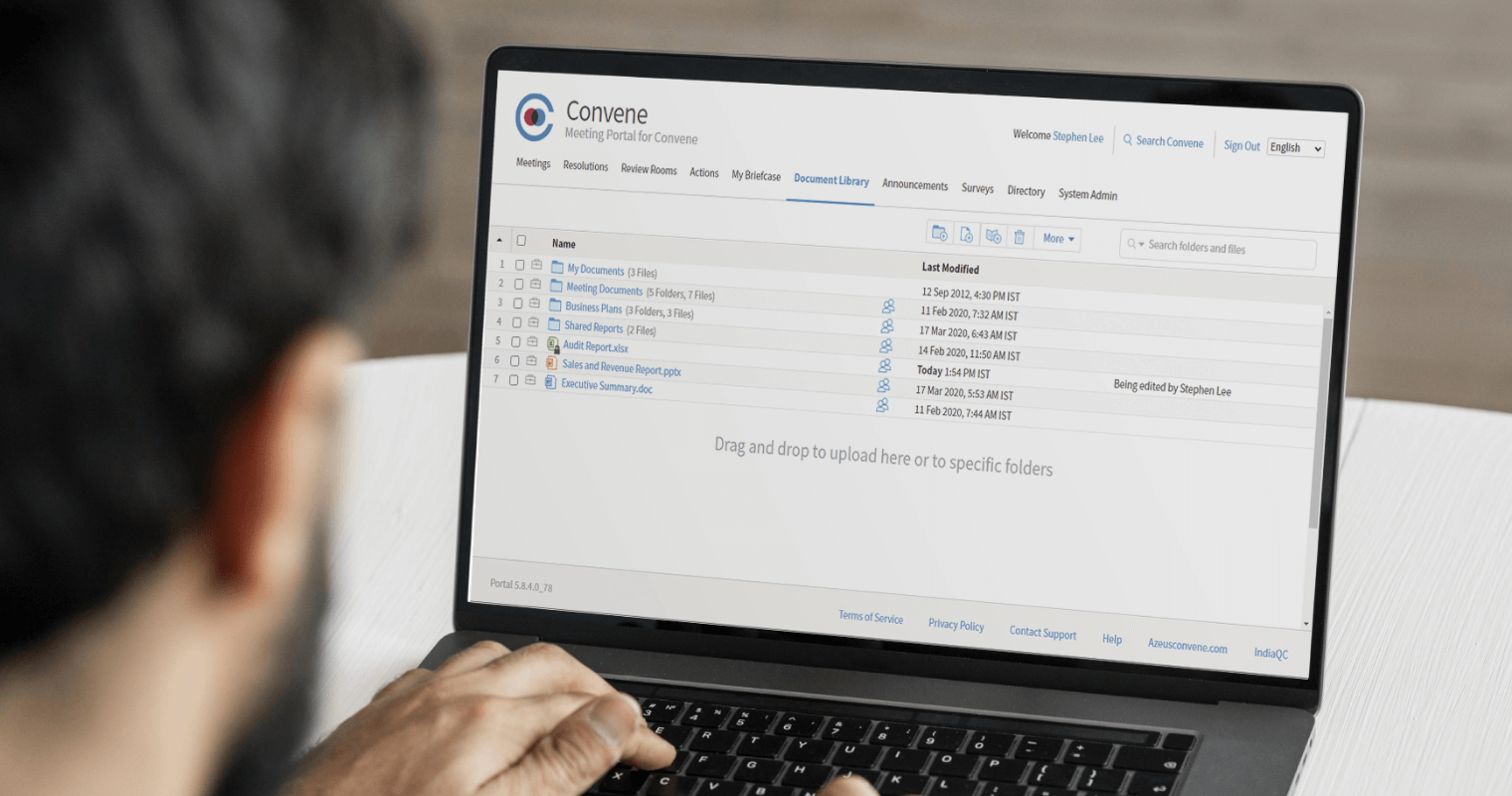
Equipping leaders with the right tools for successful digital governance is what Convene is designed for. This board management software empowers boards to securely manage critical data and promote strong auditability and transparency.
Convene is proud to support organizations across the MENA region in their digital governance journey. Institutions like the American University in Cairo leverage Convene’s secure platform to streamline its board meetings and workflows. Similarly, King Hussein Cancer Foundation in Jordan also utilises Convene to manage confidential medical records, while adhering to data privacy practices and compliance. Discover more about Convene by scheduling a walkthrough with our Sales team.
Jielynne is a Content Marketing Writer at Convene. With over six years of professional writing experience, she has worked with several SEO and digital marketing agencies, both local and international. She strives in crafting clear marketing copies and creative content for various platforms of Convene, such as the website and social media. Jielynne displays a decided lack of knowledge about football and calculus, but proudly aces in literary arts and corporate governance.








